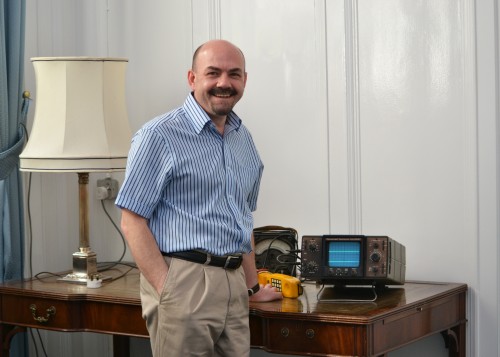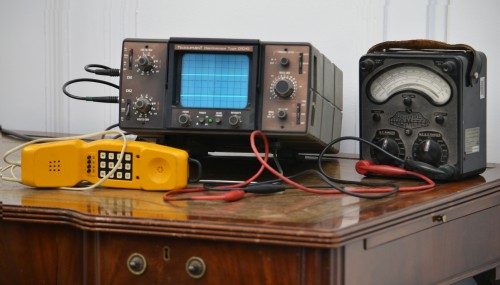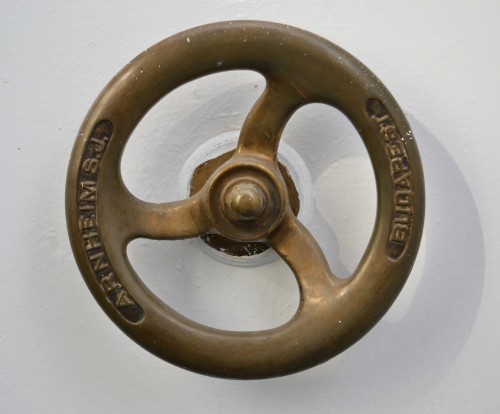14th March 2014 Budapest, Hungary
Reflections on 25 Years Service with the Foreign and Commonwealth Office
Guest blog by Technical Services Officer Matthew Smith

I joined the Foreign and Commonwealth Office (FCO) in late 1988 as an apprentice Telecommunications Technical Officer. With keen interests in travel and electronic engineering, this seemed the ideal job opportunity and the subsequent 25 years have not disappointed.
The recruitment process had taken half a year and, amongst the more traditional techniques for determining suitability, had involved tests to see how quickly I could pick up washers with tweezers. Despite my hands shaking like a Trabant, I made it through the tweezers test and eventually an envelope impressively marked with ‘On Her Britannic Majesty’s Service’ arrived, containing an offer to join nine other trainees on the programme.
My first four years with the FCO involved a lot of training courses and took me to such exotic locations as York, Cheltenham and Milton Keynes. This was a time of dramatic change for FCO communications around the globe and we were developing satellite and land telephone links to replace the existing ageing and slow radio systems.
The huge fields of antennae that had dominated the landscape around our headquarters in the North Buckinghamshire countryside were rapidly being dismantled, leaving the pastures to grazing cattle and unfortunate ramblers who would stumble across our imposing barbed-wire surrounded site, and beat a hasty retreat.
I was assigned to development work in the UK, on the emerging field of computer networks. This was not exactly what I had had in mind and I constantly asked to be sent abroad. Perhaps for some peace and quiet my manager gave in, and my first international assignment was to Tel Aviv to test telephone modems that could send information at the dizzying speed of 1200 bit/s (modern broadband is around 10,000 times faster).
It was a huge leap forward at the time as the radio systems had transmitted data at about the same speed as it could be typed, on a system that was known as ‘Piccolo’ – because that was what it sounded like in operation.

It was here that I discovered that my colleagues who created the reports to be sent to the UK wrote them in their own sort of code even before they were encrypted. Telegrams were full of acronyms and obscure phrases. Thankfully, this is something that has largely gone the same way as the aerials, and plain English is now de rigueur.
Jumping forward ten years, my desire to explore had been fulfilled with short trips to around fifty different countries culminating in the fantastic opportunity to live and work in Singapore and Malaysia. Technology had marched on and we had desk-to-desk secure communications worldwide – but only twice a day unless there was an emergency!
The need to protect personal and official information as well as the logistics of worldwide deployment meant that our IT solutions seemed a long way behind what was available in the impressively stocked computer shops of Singapore.
Time-travel with me again, forward to the present. With many more countries visited in the line of duty and fulfilling postings to Switzerland and Hungary, my itchy feet have been well and truly scratched. My biggest and best adventure – starting a family – has happened on the way. Remote working is now a reality, enabling staff to achieve a better balance between work and home life.
We have a truly global IT network so colleagues with regional responsibilities can log into their official telephone and computer accounts at distant locations. Collaborative working tools have been introduced and we have access to the internet and social media whilst maintaining information security, an achievement that is easily underestimated when waiting ages for applications to load.
The balance between meeting official needs and achieving excellent value from government investments is a fine one. We expect a far greater operating lifespan from our IT than most organisations and this is a notable accomplishment in itself. Although our technology has progressed sporadically, we have always used the most advanced security features resulting in an outstanding record on data protection and a robust defence against malicious software attacks.
FCO Services now operates as a Trading Fund of the FCO, providing secure facilities to governments and international organisations worldwide. The award-winning apprenticeship scheme is still operating, in a similar form to 25 years ago (although I am not sure if the prerequisite tweezers/washer dexterity still exists). I look forward to many more years of travel, adventure and slightly out-of-date IT.
